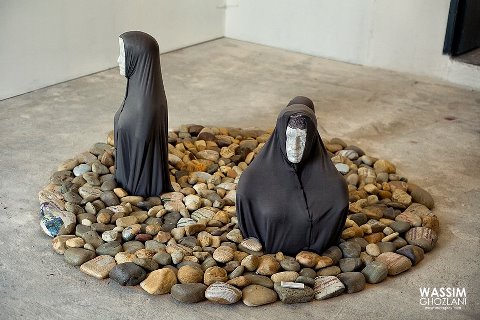Tunisia builds blasphemy law
In Tunisia, politicians and the people are abandoning freedom of expression. In a conservative society, Islamists’ obsession with blasphemy and the opposition’s passivity in defying an illiberal constitutional clause are placing free speech and Tunisia’s democratic transition under threat.
After years of being deprived of it, the Tunisian public agrees that freedom of expression is a fundamental right which needs to be guaranteed by the country’s new constitution. Six assembly committees which were elected last February have separately drafted different sections of the text which is yet to be presented for debate and voted in the 217-member constituent assembly. An absolute majority is required for the adoption of each article. MPs will then have to approve the entire draft by a two-thirds majority.
“Freedom of expression, opinion, media and creativity is guaranteed,” states article 26 of Tunisia’s draft constitution written by the rights and liberties assembly committee. Article 3 contradicts it saying: “The state guarantees freedom of religious belief and practice and criminalises all attacks on that which is sacred.”
But in August the Islamist Ennahdha party filed an anti-blasphemy bill which criminalises “curses, insults mockery, and desecration” of Allah, the Prophets, the three Abrahamic books, the Sunnah (the practices of the Prophet Muhammad), churches, synagogues and the Kaaba (the most sacred building in Islam). The bill also forbids pictorial representation of God and Prophet Muhammad.
Sadly, secular politicians are not pushing back against these new threats to free expression. When Islamists portray themselves as the guardians of the “sacred” in order to score points against their rivals, secular politicians face a dilemma. Should they stand up for their secular values and oppose blasphemy laws — and so risk losing popular support among the populace — or stay silent?
They have chosen silence.
In an essay entitled Speaking on the Unspeakable: Blasphemy & the Tunisian Constitution, columnist Monika Marks condemns their decision to stay mute:
Groups that would typically be expected to oppose Article 3, like the Tunisian League of Human Rights, journalists’ associations, and secularly oriented political parties, have kept silent — likely for fear of losing legitimacy with Tunisian society, which tends to view offences against Abrahamic faiths in general, and Islam in particular, as unacceptable.
Free speech advocate and journalist Henda Hendoud shares the Marks’ view and argues that the opposition is not strong enough to tackle the issue of religion and freedom of expression at the National Constituent Assembly.
“I think that if there is going to be pressure and controversy regarding article three, it will come from the civil society, which is somewhat more independent and distant from political calculations,” she says.
The view that freedom of expression must be regulated to protect “sacred religious symbols” is widely held in Tunisian society. It is a Sunni Muslim-dominated country and religion still plays a major role in the people’s daily lives despite 56 years of secular dictatorship under the presidency of Habib Bourguiba and his successor Zine El Abidine Ben Ali. It is likely that Tunisia’s new constitution will criminalise blasphemy, and the public will not protest because “protection of the sacred” and the “sacred” are important to them.

A sculpture by Nadia Jelassi depicting the stoning of women at this summer’s Tunis Spring Arts Fair
Only a small group of free speech advocates, journalists and activists regard blasphemy laws as a curb on free expression. They are worried new blasphemy legislation will see similar incidents to that which took place at the Spring of Arts fair between 1 and 10 June this year, when ultra-conservative protesters clashed with police over an exhibition which they claimed included “blasphemous” artworks. The government and, surprisingly, the Minister of Culture blamed the fair for attacking Tunisians’ sacred religious symbols.
The “blasphemy” pretext was enough to bring “public disorder” charges against two artists, Mohamed Ben Slama and Nadia Jelassi. Ben Slama exhibited an artwork illustrating the “Praise God” phrase inscribed by ants, while Jelassi displayed sculptures depicting the stoning of women.
In late June, Hendoud helped set up a support committee for Ghazi Beji and Jabeur Mejri, two young men sentenced to seven and a half years in prison for publishing cartoons of the prophet on the internet. “The political parties are still not talking about the case of Ghazi and Jabeur,” she says. “However, the two young men are supported by Tunisian and international civil society.”
Blasphemy can be used as a pretext to stifle freedom of expression and pave the way for the comeback of dictatorship. Former dictator Ben Ali exiled, jailed and tortured his Islamist political opponents, who today rule the country, under the pretexts of “national security” and “extremism”.
Criminalising blasphemy is only going to deepen divisions in a country which endured decades of oppression and abuse.
ALSO READ: A NEW ARGUMENT FOR CENSORSHIP?
